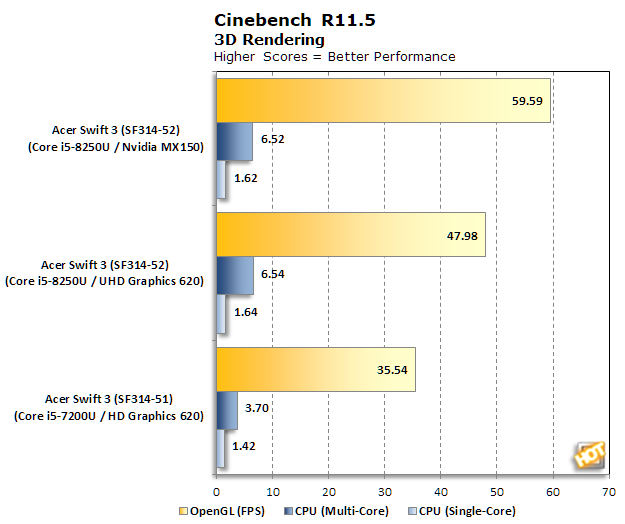Intel 8th Gen Core Mobile Performance Review: Kaby Lake R Explored

The Core i5-8250U brings a small 10-15% improvement in both tests over the Core i5-7200U. The eighth gen notebooks trade blows between the tests but ultimately both fall within each other's margin of error, so we'll call those a draw. These tests do not leverage the GPU to any extent so we wouldn't expect a significant difference between the two models anyway.
Heavier-Duty Rendering And General Compute: Cinebench and Geekbench
We then turned our attention to a couple of general purpose benchmarks with Geekbench 4 and Cinebench. Cinebench is a test that works both the CPU and GPU engines of the processors. Cinebench is developed by Maxon, which is better known for its Cinema 4D software employed in professional 3D rendering and animation. Geekbench is a cross-platform benchmark that pushes simulated workloads designed to mimic real world processing requirements for functions like image processing and particle physics. We tested both of Cinebench's integrated benchmarks for CPU and GPU in versions R11.5 and R15, along with Geekbench's Single-Core and Multi-Core CPU test workloads.


As expected, the extra cores in these 8th generation chips blow away the Core i5-7200U in multi-threaded workloads. We do see the HD Graphics 620 model pull slightly ahead of the GeForce MX150 model across the board, which seems to indicate either some power budget being shifted from the CPU to the dedicated GPU or the MX150 contributes to some thermal overhead. However, our testing did not reveal any significant deviations in throttling or temperatures between the two units and in fact the clock speeds remain a few hundred megahertz higher during the OpenGL test for the MX150 equipped notebook.
Speaking of OpenGL, despite incorporating effectively the same Intel HD Graphics 620 solution, the newer model does carry a slight performance edge. The newer processor clearly alleviates at least some CPU-bounding which lets the UHD Graphics 620 stretch its admittedly still entry-level legs just a touch more. The MX150, on the other hand, ramps performance up quite a bit which more than offsets the very minor CPU performance losses for most use cases.
These synthetic benchmarks don't always translate to real-world benefits though, so let's move onto some scripted workloads...







